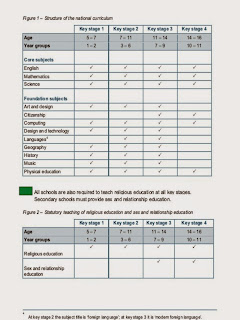The Challenging Curriculum in England
The development of education systems and progress in England has running so firmly established. The new curriculum will challenge the teacher to provide the needs of students in face of later life in modern Britannia. This can be an advantage for the teacher to develop and force them in collaborate all of the aspects to gain the attainment targets. In term of education, this will be a best moment to achieve a higher expectation for the teacher in develop the students competence based from the new curriculum.
These programs obviously aim on the development of pupils’ competence, especially in numeracy, mathematics, language and literacy across the school curriculum. The attainment targets are for all subjects from range 5 years old to 16 years old.
The role of teachers in this curriculum is absolutely important. Instead of using the conventional ways, they must find new techniques and social-technology approach in teaching according to the basic foundation of new curriculum. In this curriculum, teachers should set high expectations for every pupil. They should plan stretching work for pupil whose attainment significantly above the expected standard also an obligation to plan lessons for pupils who have low levels of prior attainment or come from disadvantaged backgrounds.
In addition from this curriculum, teachers should take account of their duties under equal opportunities legislation that covers; race, disability, sex, religion or belief, sexual orientation, pregnancy and maternity and gender reassignment.
The school has an obligation to prepare and introduce this new national curriculum in England massively. The statutory national curriculum needs the school to actively playing the role to spread broadly this knowledge, they are; schools must provide access to a minimum of one course in each of the four entitlement areas (the arts, design and technology, the humanities, and the modern foreign language), schools must provide the opportunity for pupil to take a course in all four areas should they wish to do so, a course that meets the entitlement requirements must give pupils the opportunity to obtain an approved qualification.
All state-funded school must offer a curriculum which is balanced and broadly based and which:
Promotes the spiritual, moral, cultural, mental and physical development of pupil at the school and of society, also
Prepares pupils at the school for the opportunities, responsibilities and experiences of later life
The structure of the national curriculum, in terms of which subjects are compulsory at each key stage, is set out in the table below:
 |
| The New Curriculum in England |
http://www.gov.uk/dfe/nationalcurriculum.
Concerning a wide range of pupils have special educational needs, many of whom also have disabilities. The lesson should be planned to ensure that there are no barriers to every pupil achieving. In many cases, such planning will mean that these pupils will be able to study the full national curriculum. The SEN Code of practice includes advice on approaches to identification of need which can support this. A minority of pupils will need access to specialist equipment and different approaches and the Sen code of practice outlines give the needs to be done for them.
In the end, all elements that have roles about this national curriculum must realize that this is just only a beginning. The real challenge lies upon the teachers who will make this project success.
No comments:
Post a Comment